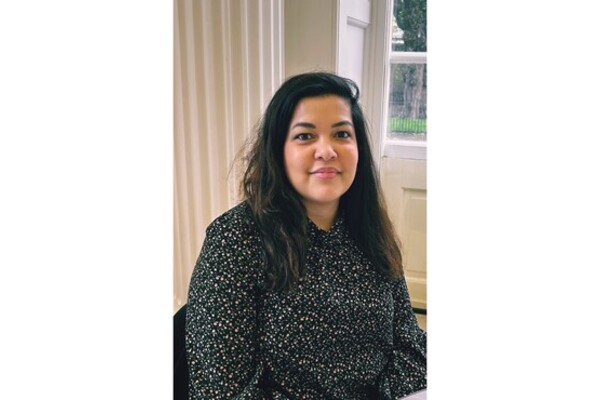Since our inception back in 2003, UMHAN has had the pleasure of meeting, working with and welcoming as members, a whole host of incredibly skilled and experienced people from all over the United Kingdom. In December 2020 we decided to celebrate our longest standing members during our annual all member meeting as well as providing them with an exclusive 5+ or 10+ year certificate and email badge that demonstrates their dedication to UMHAN over the years.
As part of this celebration, we also thought it the perfect opportunity to promote the incredible knowledge, skills and experience our member base holds and invited some of our longest standing members to share with us their path into their current position, and how UMHAN has helped support them along the way. As today is also World Social Work Day, we have the perfect member to focus on for our first of the series of interviews
First up, we welcome Kev Rayson - Senior Disability Advisor (Mental Health) at the University of Oxford. Kev qualified in social work before beginning his career in student mental health where he has been for the last 8 years. Kev has been a member of UMHAN for over 7 years and has so far been in his current role for 18 months.
Can you outline your career and how you got to where you are today?
In my teens and early 20's I had very little idea of what I wanted to do and went to university mainly because everybody else seemed to be doing it! I was the first person in my family to study at higher education level and studied for a BSc in Third World Development. The course took a critical view of global inequality and development through a range of different topics from economics to politics, history and geography. I had no career path in mind I just found the issues and subject compelling and wanted to learn more. The insight from this helped shaped my world view and still influence me today.
After university, my early career was in health and social care with several roles working for housing associations, mainly as a sessional support worker and project worker. This involved supporting the running of residential properties for vulnerable adults, primarily those with a long history of extended mental health hospitalisations, difficulties with drug and alcohol abuse and recent care leavers.
Following a family bereavement I took a career break and spent a couple of years working in retail and travelling before taking the decision to train as a Social Worker. Unlike many of my peers I had no set idea of where I wanted to end up though. Many seemed to have a very clear idea of working in child protection services, or hospital social work for example. I wasn’t even certain I wanted to work in a traditional social work role but knew I wanted to synthesise my previous work and personal experiences and ‘up-skill’ them to see where it might take me. Initially I found this quite anxiety provoking but was reassured by my tutors that this absolutely wasn’t necessary and in fact many students would go in with one idea about where they wanted to end up and finish their training with a completely different aim often influenced by their placements.
In hindsight, mental health was a natural route for me to follow but it wasn’t something I went in with a set idea about. My training did ultimately solidify this with placements at a mental health charity, supporting people in the community and in my second year working in a secure children’s home. I found both to be very challenging but ultimately gave me an excellent grounding to work in the field of mental health in two very different settings.
By the time I completed my social work degree I had decided not to pursue a long-term career in statutory social work, though I did expect to go into a statutory role for at least a year or two and applied for jobs at several local authorities. I also continued to work for the same mental health charity I had carried out my placement with. I then saw a job working at a university that was seeking mental health advisors, people with qualifications and experience in health and social care settings. I hadn’t previously known this kind of job existed but on reading the job description and influenced by my own university experiences, I knew immediately it was a job I wanted to do. So I applied and was fortunate enough to be offered the position at my previous university where I remained for 6.5 years before applying to my current role at the University of Oxford.
How does your experience and training help you to do your job well?
Much of my work as a disability advisor involves assessing students’ needs for reasonable adjustments and helping them to access entitlements and support they may not be aware of, or may not have previously considered. I can then support students to access this support and help to coordinate certain elements of it. I see it as something akin to a care coordinator but in an educational setting, so rather than being about health and social care it is about study-related issues. Helping them to ensure things that need to be in place are. With a student’s permission and where relevant I can also liaise with others outside of the university about the support available to them, acting as a point of contact between the university and wider health and social care professionals. An important concept in social work practice is around supporting an individual's informed choices. I really feel this is a large part of my role, from disclosure, to accessing support, to choices about how to proceed with studies with respect to the impact of mental health disability. So, much of the skills, experience and knowledge that I gained through my social work practice are directly transferable, simply applied in a different context.
My background in social care and my social work training, in particular, have helped me to develop what I hope are good boundaries and self-care practices too. One thing I particularly took from my practice educator in social work was that it is critical to take steps to look after yourself away from work, otherwise you will not be in the best position to support the people you’re working with, whatever your role. This is always easier said than done but a big key to this for me, is being able to understand your role clearly. This isn’t just in terms of day to day tasks but where this fits into a wider system and how it interacts with other professions or colleagues. This helps to communicate with and ultimately provide a better service to the people you’re working with. The above are all also supported by good practice supervision and line-management.
Can you briefly explain your day-to-day responsibilities?
My current role is within the Disability Advisory Service (DAS) at the University of Oxford. I have a number of responsibilities including direct work with students alongside a line management role.
Direct student work is to act as the primary point of contact in the DAS for students and staff at specific Oxford colleges to support students that have disclosed a mental health disability to the university, or are considering whether to do so. This involves working collaboratively with colleagues in different parts of the university and at all levels and also on case work with DAS colleagues where students may have co-occurring disabilities alongside their mental health.
The aim, as I see it, is to minimise the potential for academic or personal crisis wherever possible by identifying any areas of concern in the student’s studies or mental health and facilitating access to reasonable adjustments and external support such as Disabled Students Allowances (DSA). As you might imagine, it can also at times involve liaising with professionals involved a student’s care outside of university and advising students about the resources available to them, both within and outside of university as needed.
I also work alongside my DAS colleagues to support wider university policy and explore ways to improve access and provisions in place for disabled students at an institutional level. Essentially the aim is to develop structured study-related support for students that can reduce pressure and reliance on reactive mental health support. Through my experience in this area I have learned that an inclusive education environment really can be the difference for many students alongside other kinds of support.
The second aspect of my role is as a line manager for a superb team of mental health mentors and the three other mental health disability advisors, who're all involved in much of the same work. Alongside our head of service, I also act as a specific point of liaison with our colleagues in the counselling team to discuss and develop mutually beneficial ways of working together.
What’s helped you to stay in your role?
I have been extremely fortunate in my higher education career so far to work in very dedicated, knowledgeable and supportive teams, so I would have to say my colleagues and the teams I’ve worked in. This as well as networking with colleagues at other institutions, has been a key area of support for me. Working in any area of student support, whether disability, counselling, wellbeing or welfare staff based in academic departments, colleges or accommodation services is demanding. Providing meaningful support to a large number of students in difficult circumstances can impact our own wellbeing. I have been fortunate and extremely grateful to work in close-knit supportive teams and in turn, have been able to support my colleagues when required.
I also enjoy working in multi-disciplinary teams with staff from a range of backgrounds and with complementary specialisms in different areas. I greatly value the opportunity to draw on the experience of colleagues in a broad range of fields including teaching and learning, counselling, social care, mental health, drugs and alcohol, formal advice services and others. This fosters close collaborative working, whereby we can encourage each other to develop in a calm, supportive and reflective manner. I strongly believe that this in turn, allows us to provide the best possible support to students and when it works well for them it is very rewarding too.
What part has UMHAN played in this?
UMHAN has been a constant source of support throughout my career. In the early stages, outside of counselling, there were very few mental health specific roles in HE perhaps one or two at each university at most. UMHAN offered an opportunity to learn from others that had really established mental health advisor and mental health disability advisor roles from almost nothing and I learned a great deal from my contact with colleagues working in similar roles at other institutions. It really helped me to understand what this role might represent and also how the values, skills and practices I had developed in health and social care would translate to an education setting, which is very different from those areas in terms of remit, legislative frameworks and resources.
Although as I’m sure with many other members, my day job doesn’t allow me the time I would like to be as involved as I would hope, I have always valued the input of colleagues working in the sector and understanding how ideas or ways of working may translate into my own work and the services I’ve worked in. It’s extremely important not to become ‘siloed’ and while not every idea will transfer wholesale from one place to another I truly think universities can learn ideas, good practice or different ways of doing things from each other. This has happened more and more as time has gone on which is great to see and UMHAN is certainly an important factor in this. It’s incredible to see how it’s grown from the first meeting I attended which had maybe 10 people present!
What’s your favourite part of your role?
Quite simply, meeting all of the wonderful students! Eventually over time seeing them gradually become more confident in themselves and hopefully thriving in their education. Playing a tiny part in supporting student’s success (whatever that means for them) at university. I love to see things work out well for people, especially when you have some insight into the obstacles and challenges they may be facing alongside their studies.
A former colleague and I would make a point of sitting and watching all the graduation ceremonies online to see which of our students appeared and it was really rewarding to see people that you may have met 3 or 4 years previously going up to collect their degree award.
What has changed in student mental health since you started your role?
Students and young people in general have a greater voice and are increasingly able to talk about their own mental health and raise awareness amongst themselves and others, reflecting a wider change in society. When I was an undergraduate student, in the early 2000's mental health simply wasn't talked about amongst my peers and while I'm sure support was available, I don't ever remember it being discussed or very visible. However, looking back I can see that I saw many of my friends and peers struggle with various aspects of their mental health during their studies but without recognising it, much less knowing what to do about it or considering that they would approach their university for help. There’s still a long way to go but things are moving in the right direction and that has been clear to see.
In tandem with this, the sheer number of students that disclose a mental health condition to university prior to arriving has changed immensely. There is often a negative focus on this in the media as it’s perceived to be reflective of a rise in incidence of mental health difficulties in young people and at universities. I think that is part of it for sure, but another side to this is that it hopefully means that students and young people have a better awareness of their mental health. That they are considering reaching out for support before they come to university, or before they decide to leave their course or worse, become so unwell that choice is no longer there for them.
It may reflect that stigma and concern around stigma is gradually reducing such that more and more students understand that disclosure during application or prior to arrival at university won’t negatively impact their chances of being accepted or succeeding. When I began just 8 years ago, the number of students disclosing a mental health condition prior to university was negligible, now we have almost as many students registering a mental health disability prior to university as specific learning difficulties, which have been historically more heavily represented in HE and more commonly supported and recognised at earlier stages of education.
What do you think are the biggest remaining challenges?
I think the biggest challenge is the one that has always been there in my time in the sector, namely to synthesise the various kinds of support available to students so that they are as visible, accessible and seamless as possible. By and large there is lots of support available to students at university, often more than would be available in any other stage of life. However, it can still sometimes be difficult for students to understand how to access support and where to find it. There is also sometimes a lack of understanding around what is within the remit of an education provider to offer.
Policy and national discussion tends to focus largely on developing collaborative working between the health and education sectors so that students that need care and treatment for their mental health are able to access it promptly. This has long been recognised as an issue by UMHAN and others working in student support roles. More recently it has come to prominence at a national and leadership level, driven by Student Minds, UMHAN and others, so that policy changes can support this. Getting students involved in these discussions is a key element too, so it is great to see that happening more and more.
Every university however, will have different local circumstances and challenges. Wider disparities in access to mental health care that unfortunately exist outside of the higher education setting are likely to have been exacerbated during the coronavirus pandemic and also affect how much progress can be made in this area. University communities don’t exist separately from wider trends in society. For me, the way this works will always have some difference or nuance to it depending on the area and structure/size of the university. At the most obvious level there will be great differences in what is available or possible between large universities in big cities or smaller rural universities, for example. We can definitely learn from different contexts to work towards a better understanding of what is required but there isn’t a one size fits all approach.
The rise in numbers of students disclosing mental health disability and the wider awareness raising around mental health in young people does present a challenge in this regard. It follows that the biggest change would also present the biggest challenge. I think universities, and university leaders have been a little slow to react to the change that people working in student support services have been aware of some time. Thankfully this is now changing. However, one area that I think is often overlooked when we talk about wellbeing and supporting wider mental health on a broad scale (which is absolutely essential) is mental health and disability and how we best support students where their mental health falls into this definition. Universities have a clear framework through the Equality Act (2010) and reams of associated guidance and collective experience of colleagues working in this area in the sector to support students that experience the most disabling impacts of mental health. I think there is still a difficulty in understanding where the general mental health and wellbeing of the university population as a whole and mental health disability intersect and how we approach supporting students in these different contexts. It still feels like a slightly disjointed conversation to me and can result in a disjointed experience for students. At larger universities, which is where I have worked, students may be sent to a counsellor, or to a disability advisor or a dedicated welfare officer or a mental health advisor. They may also have a specialist mentor or a study skills tutor. Then they have staff based in academic departments or colleges, personal tutors, academic welfare tutors, disability contacts. That’s not to mention any additional support or care they receive outside of the institution. All of these are important sources of support for a student and there’s no right or wrong way to access support. However, from what I can see it can take too long for students to get to or be aware of the full range of support potentially available to them. I still see far too many students towards the end of their course that have never heard of DSA, for example. The move to cope with the increase reporting of mental health difficulties in the student population can inadvertently and counterproductively make things more difficult in some cases. The multitude of different options and responsibilities in these areas become blurred/confused and can mean the full range of support potentially available may not always be fully realised or considered.
I think there is still a lot of work to do in this area of understanding that universities do have a statutory duty towards students with disabilities. This includes a large proportion of students experiencing mental health difficulties so I think there is a risk of divorcing this from the wider context of a whole institution approach to mental health. If we fail to see reasonable adjustments as relevant to structural change or policy/procedural change in the area of student mental health then, for me, we’re missing something quite significant. In fact, it could be argued that there are relatively clear frameworks for defining what support should look like in this context and these have been in place in some form or another for over 25 years. Working largely in disability services and specialising in mental health, I’m biased, but do I think this is as relevant and important as ever and we need to work to dispel the reductive view that reasonable adjustments are only about exam arrangements or routine individual adjustments around teaching and learning.
It will take time and the obstacles disabled students face, despite 10 years of the Equality Act and 25 years of the Disability Discrimination Act, are still numerous and many are the same as they have been. This was highlighted in the recent ‘Arriving at Thriving’ report where the obstacles and burdens disabled students still experience were highlighted and I feel strongly this is undeniably relevant and linked to the wider discussions around student mental health, not a separate consideration. If we can push forward with more inclusive ways of structuring our universities with disabled students in mind, this will have a significant impact on those students and I believe the wider university community. It may seem trite but I do believe that ‘what is likely to be good for disabled students is likely to be good for all students.
Have you got any feedback from students that you could share with us?
Actually, in my experience students are very generous in their feedback but sometimes a short thank you is easy to miss amongst the large workloads many of us in HE experience. Unfortunately, there are also the occasional lengthy processes of trying to make amends when things haven’t worked out well for someone too.
I’m going to cheat and say my most treasured piece of feedback is actually from the parents of a student that I worked with for a number of years. I had never met or spoken to them but when this particular student graduated, they took the time to write me a letter. I won’t give details but they expressed that while they had a difficult few years as a family, not least the serious impact of the mental health of the student, knowing the support the student had received through our service had reduced their worry. It seems obvious in hindsight but it hadn’t really occurred to me that students would discuss their disability support with their families and even mention who the people were supporting them. That this made a difference to the extent they would contact me out of the blue, showed me that sometimes the work we do reaches well beyond the students that we see and speak to face to face.
Thank you so much Kev for sharing with us, there are some incredibly interesting points raised here which we’re sure will provoke some even more interesting discussions. If any members would like to pose any questions to Kev, you are as always invited to head over to the community forum where the conversation can continue.









